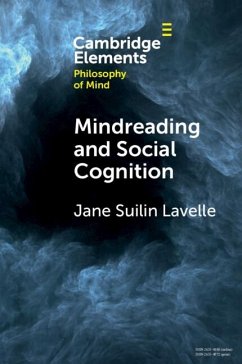The cognitive ability to think about other people's psychological states is known as `mindreading'. This Element critiques assumptions that have been formative in shaping philosophical theories of mindreading: that mindreading is ubiquitous, underpinning the vast majority of our social interactions; and that its primary goal is to provide predictions and explanations of other people's behaviour. It begins with an overview of key positions and empirical literature in the debate. It then introduces and motivates the pluralist turn in this literature, which challenges the core assumptions of the traditional views. The second part of the Element uses case studies to further motivate the pluralist framework, and to advocate the pluralist approach as the best way to progress our understanding of social cognitive phenomena.
Dieser Download kann aus rechtlichen Gründen nur mit Rechnungsadresse in A, B, BG, CY, CZ, D, DK, EW, E, FIN, F, GR, HR, H, IRL, I, LT, L, LR, M, NL, PL, P, R, S, SLO, SK ausgeliefert werden.


